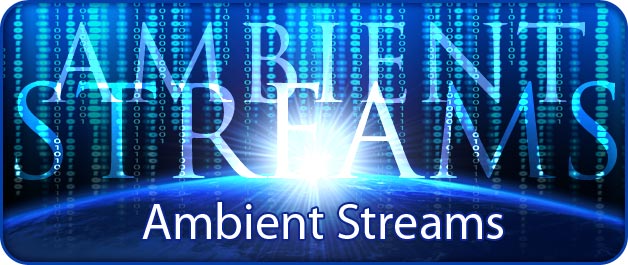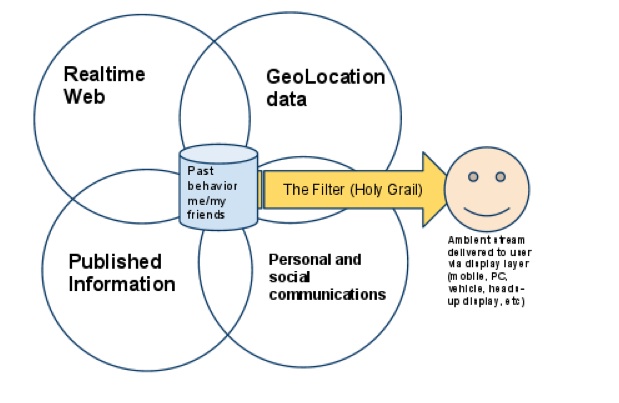
The following guest post was written by Edo Segal (@edosegal).
It was 1993 and I had just decided to drop out of college. I was a graphic design major in a great art school but decided I want to start my second company. Knowing this would mark the conclusion of my studies there I set out to create my final project. I would write a short story, design and produce it in print. I put out an edition of 300 and gave it to my friends and people who inspired me like author William Gibson.
Cut to November, 2009, when I returned from sitting on a panel at the second Realtime CrunchUp. I had urged the audience and participants that when thinking about the realtime web we should not consider the challenge through the lens of how consumers behave today. I argued that the future potential of the realtime web is not in the misnomer “realtime search,” as the consumption of this signal will predominantly be in what I call ambient streams. These are streams of information bubbling up in realtime, which seek us out, surround us, and inform us. They are like a fireplace bathing us in ambient infoheat. I believe that users will not go to a page and type in a search in a search box. Rather the information will appear to them in an ambient way on a range of devices and through different experiences.
A few days after I got back from the CrunchUp, I was organizing some old documents when I stumbled on I Was Just Dead< , a cyberpunk short story I wrote 16 years ago. A story about a world of augmented reality. A world where at birth a chip is embedded in people’s brains creating a reality where they no longer discern what is “real” and what is augmented in their surroundings (Hear the audio-book or download the free eBook below). It was strange to hear my former self calling out about the importance of augmented reality from across the span of almost two decades of experiences in the digital world, half of which were spent solving the problem of how to filter the massive realtime stream.
When trying to understand something potentially transformative, knowing what questions to ask is more than half the challenge. We are still in the early stages of these changes and don’t yet have the necessary metaphors to make the leap into the future. It is for that purpose that I want to suggest what I consider to be the building blocks of our next big evolutionary leap in how we use technology. The four main building blocks are:
- Realtime Web (Twitter, news flows, world events, and other information which relates to changes in the world)
- Published Information (sites, blogs, Wikipedia, etc.)
- Geolocation Data (your location and information layers related to it, including your past locations and that of your friends, as well as geo-tagged media)
- Social Communications (social graph updates, IMs, emails, text messages, and other forms of signal from your friends).
Before these building blocks can create an ambient stream which is not overwhelming, all of this data needs to pass through a filter. The Holy Grail is a filter which only serves up information which is relevant based on who you are, your social graph, what you or your friends are doing now, what you or friends have done before, and in context of other information you are consuming. It needs to be delivered wherever you are and on whatever device or display can deliver the ambient stream: mobile phone, laptop computer, TV, heads-up display in vehicle or inside your glasses. The future of how ambient streams might enter our world is illustrated with the following simplistic diagram:

Putting all of these building blocks together will be an industry-wide task. There are a relatively small number of people who have already managed to spend a lifetime thinking about this problem. It has bred several academic disciplines and many sci fi novels and films. These related fields include pervasive computing, everyware and the buzzword du jour augmented reality (AR). All of these technologies produce ambient streams. AR, in particular, (which is focused mostly on methods of how to render information visually) is capturing the imagination of innovators around the globe. The underling technologies that allow devices to marry data to physical locations continue to evolve at a fast pace, and with other disciplines jumping into the mix the magic is finally starting to happen.
One only needs look at a teenager today as they do their homework, watch TV, play a game, and chat while watching their Facebook stream to get a sense for humanity’s expanding affinity to consume ambient streams. Their young minds are constanty tuning and adapting to an age of hypertasking .A very useful metaphor is that humanity is constructing its own synthetic sixth sense. An ambient sense that perceives the context of your activity and augments your reality with related information and experiences. Increasingly, we will be sensing the world with this sixth sense and that will change the way we collectively experience the world. Going back to the point made earlier, the watershed event is when we will be experiencing this “ambient sense” without being in a retrieval mode (i.e. not when we go to the computer or our mobile device to find information but rather as a product of our activity, location, and profile in context with the events and information available to us in a wired world).
We will be seeing the first swells of this coming tsunami in the years to come, but for our children the ambient sense will play a bigger and bigger role as it slowly evolves and weaves itself into their consciousness much like Google search weaved itself into their memory functions. The challenges we face in terms of making real progress stems from the fact that the overarching goal is one that requires a multi-disciplinary approach across a myriad of data sets. While there are many companies executing in each of the quadrants few are in a position to access the full scope of data and therefore the ability to create the Holy Grail of filters is limited. This is where the world of walled gardens and deals with major search providers presents a challenge for progress. Many iterations and mistakes need to be made before we arrive at the right way to collate and filter all these different streams of data into an ambient sense. If only one or two companies are in a position to iterate, progress will be very slow and the probability of success diminished. For success, it is necessary to create an ambient sense that will manage to balance the level of interruption with insight and arrive at the true goal of any sufficiently advanced technology, which is to be transparent and taken for granted as part of the human experience. It may sound like science fiction, but there are engineers and entrepreneurs out there already trying to make it fact.
Is it possible in the age of Facebook, Twitter, Google, and Apple for a startup to innovate across the entire stack to come up with this sixth sense? Chime in at #ambientstreams
http://iwasjustdead.com/IWasDead.swf
Guest author Edo Segal (@edosegal) has launched and sold several companies. In 2000 he founded eNow, which he sold to AOL in 2006 (after it was renamed Relegence). Today, he runs his Incubator/Investment vehicle Futurity Ventures, which recently launched a new search engine for wisdom.






























Comment